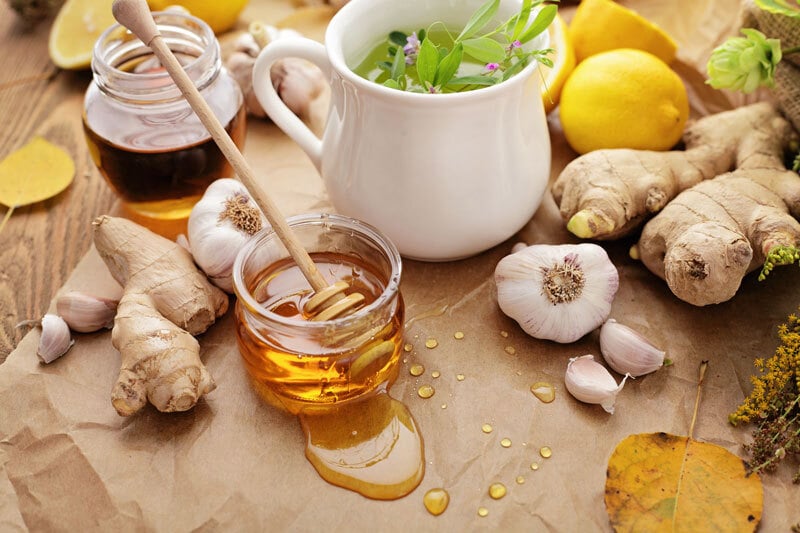The herbicide glyphosate has been detected in various types of honey, including organic variations and the popular Manuka honey.
The infamous weed killer was first named a probable human carcinogen by The International Agency for Research on Cancer (IARC) in 2015 (1). In the United States, there have been more than 100,000 claims by people who believe glyphosate-based Roundup exposure caused them to develop Non-Hodgkin lymphoma (2).
Though glyphosate has been found in packaged foods like granola, cereal, and crackers, a tainted honey supply poses a more significant, invisible threat to consumers: low-dose chronic exposure.
Products like potato chips, cookies, bread, and meat are now increasingly sweetened by honey to please (and deceive) the growing demographic of health-conscious consumers. And with more products containing honey, exposure to the chemical will add up.
Honey has been valued for its medicinal properties since ancient times, but industrial agriculture is making it nearly impossible to keep the pure sweetener pure. Monocropping and the spraying of pesticides are destroying bees’ gut microbiome and habitats, causing 10s of billions of bees to die.
Unlike genetically engineered corn and soy, honey is not a “crop” sprayed with copious amounts of pesticides and herbicides. Glyphosate residue found in honey is most likely attributed to bees’ unintended exposure to the herbicide. As pollinators, bees travel from plant to plant, making it easy for them to be contaminated by chemical cocktails sprayed by conventional farms.
The journal Nature Communications published research that showed pollen collected near corn and soy farms is contaminated with up to 32 different pesticides.
Beekeepers have no practical control over limiting bees from foraging on plants treated with chemicals. This means that the only way to resolve the issue of glyphosate-tainted honey is by banning the disastrous chemical.
Glyphosate Found in Honey Samples Worldwide
Kauai, Hawaii
In 2014, researchers tested organic honey samples and found glyphosate in 45.5% of the samples (3). In Kauai, Hawaii, 27% of honey samples taken directly from beehives were found to have glyphosate residues as high as 342 parts per billion (ppb) (EWG’s benchmark for lifetime cancer risk in children, which is 160 ppb).
This came as no surprise, as the samples were taken from the westside of Kauai, where various golf courses and highways are (glyphosate is heavily used on roadsides and golf courses in addition to agricultural areas).
New Zealand
In New Zealand, Manuka honey is a high-value export often marketed as high-quality with various health benefits.
In January 2020, New Zealand Food Safety released its “National Chemical Residues Programme Report” that tested honey samples for insecticides, herbicides, fungicides, and other environmental contaminants. In 2017/2018, they tested 300 raw and retailer honey samples and found 22.3% contained glyphosate residues. In 2018/2019, they tested 60 retail Manuka honey samples and found that 18.3% had glyphosate residues.
Canada
Researchers found glyphosate in 45.5% of organic honey samples. The Canadian Food Inspection Agency found glyphosate in 29.7% of 3,188 samples of commonly consumed foods (4).
Honey is unlikely a person’s only exposure source as glyphosate has been found in various commonly eaten foods but low-dose, chronic exposure still poses a serious risk to consumers.
Honey’s involuntary exposure to glyphosate begs the question: can consumers trust the marketplace? Beekeepers are at the hands of the big chem companies and neighboring farms so it’s up to grassroots organizations, lawmakers, farmers, and the consumers to create change.
Can You Find Glyphosate-Free Honey?
As research discovered, even organic honey can be tainted by glyphosate. The Detox Project offers glyphosate-free certifications that promise no glyphosate residue down to around 0.01 parts per million or lower levels of government Maximum Residue Limits in Japan and the EU. While you can buy local, organic honey, there is still no guarantee that you are getting chemical-free honey.
This is a bigger issue than just honey purity. The issue of dangerous levels of glyphosate harms bees and human health as well as pollutes our grounds and waterways. The only way to truly get rid of this herbicide overwhelming our food supply is to ban it. 20+ countries have banned, restricted, or decided to phase out glyphosate in the coming years, proving it is possible. Shifting to strictly organic and regenerative farming practices can create a world where bees survive, and healthy food and humans thrive.





READ the Latest
Health Habits
Longevity
Health Habits
Health Habits